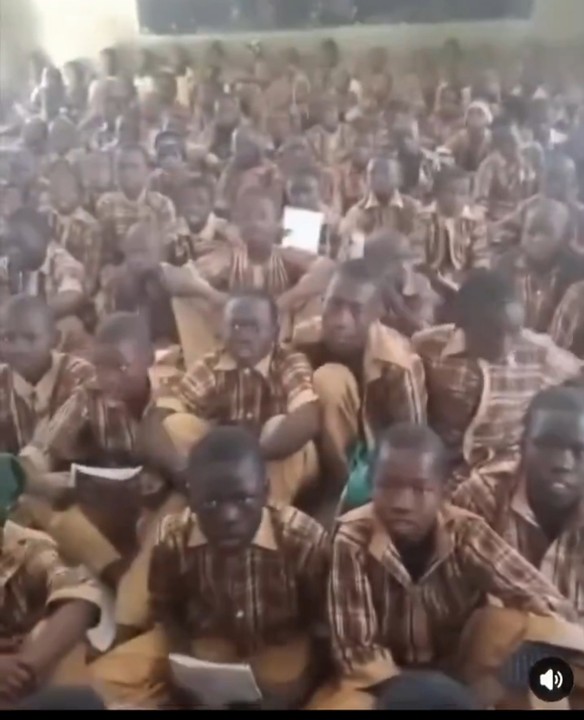A viral video showing 161 Junior Secondary School (JSS1) students squeezed into a single classroom at Turaki Model School in Sokoto has sparked widespread outrage across Nigeria. The footage, which began circulating on social media earlier this week, has triggered a fresh debate about the state of education in the northern region and the priorities of political leaders.
In the one-minute video, the students are packed shoulder to shoulder, leaving almost no space to move. A man behind the camera asks them what class they belong to. In one loud voice, the children reply: “JSS1C — 161.” The sight of so many students in one room quickly shocked viewers, leading to thousands of comments and reposts across platforms, especially on X (formerly Twitter).
The incident has raised serious questions about congestion in public schools and the quality of learning available to many Nigerian children. Turaki Model School is one of the state-owned schools in Sokoto and is supposed to serve as a model for others. However, the scene captured in the video tells a different story.
The video spread at a time when Governor Ahmed Aliyu had just gifted 1,000 Saudi Riyals (about ₦450,000) to each of the 3,200 pilgrims from the state who performed the 2025 Hajj. The gesture was meant as a Sallah gift, but many Nigerians have criticised the move, saying the funds should have been used to address serious issues in the state’s education system.
One X user, who first posted the viral video, wrote:
“161 students packed like sardines in JSS1C at Turaki Model Primary School, Sokoto, and the Governor is busy giving out 1,000 Saudi Riyals (approximately ₦450,000) to each of the 3,200 pilgrims who performed the 2025 Hajj as a Sallah gift.”
The comment captured the mood of many Nigerians who believe political leaders in the North often prioritize religious spending over education and social development. The post has generated strong reactions, with many calling the situation unacceptable and demanding urgent intervention.
Overcrowded classrooms are not new in the North. States such as Sokoto, Kano, Bauchi, and Katsina have faced significant challenges in providing adequate classrooms, desks, and trained teachers. According to past reports from education agencies, millions of children in the region attend public schools that are either damaged, overcrowded, or poorly equipped.
The backlash against Governor Aliyu is mainly tied to perceived misplacement of priorities. Critics argue that while giving gifts to pilgrims may be appreciated by some, it should not take precedence over essential services like education, healthcare and infrastructure.
Several commentators pointed out that the funds used for the Hajj gifts—estimated at more than ₦1.4 billion—could have built dozens of classrooms, provided desks, or equipped schools with basic learning materials. Others noted that the governor’s action reflected a trend among northern politicians who often focus heavily on religious sponsorships while public schools continue to struggle.
As the video continues to generate attention, pressure is mounting on the Sokoto State Government to respond. Civil society groups, education activists and concerned citizens are calling for an investigation into the condition of public schools in the state.
Many also want the government to explain why a so-called “model school” can have 161 students squeezed into one classroom without immediate plans to address the issue.
Teachers in the state have previously complained about shortage of classrooms, lack of adequate learning materials and poor staffing levels. While the government has made promises in the past, critics say little improvement has been seen on the ground.
For many Nigerians, the viral video is a wake-up call. It highlights the gap between government promises and the lived realities of children in public schools. It also shows the urgent need for better planning and stronger political will to improve education, especially in northern Nigeria where literacy rates remain lower than in the southern states.
As the video continues to circulate online, the hope among many is that the embarrassment it has generated will push the Sokoto State Government—and others facing similar challenges—to finally take meaningful action.

